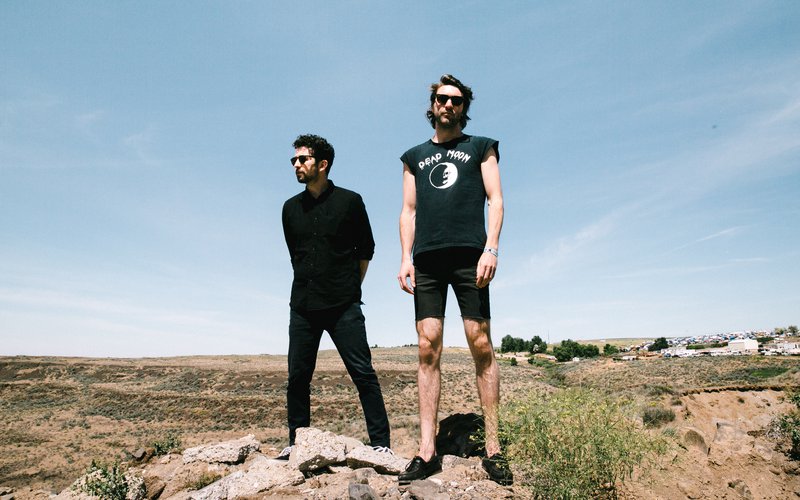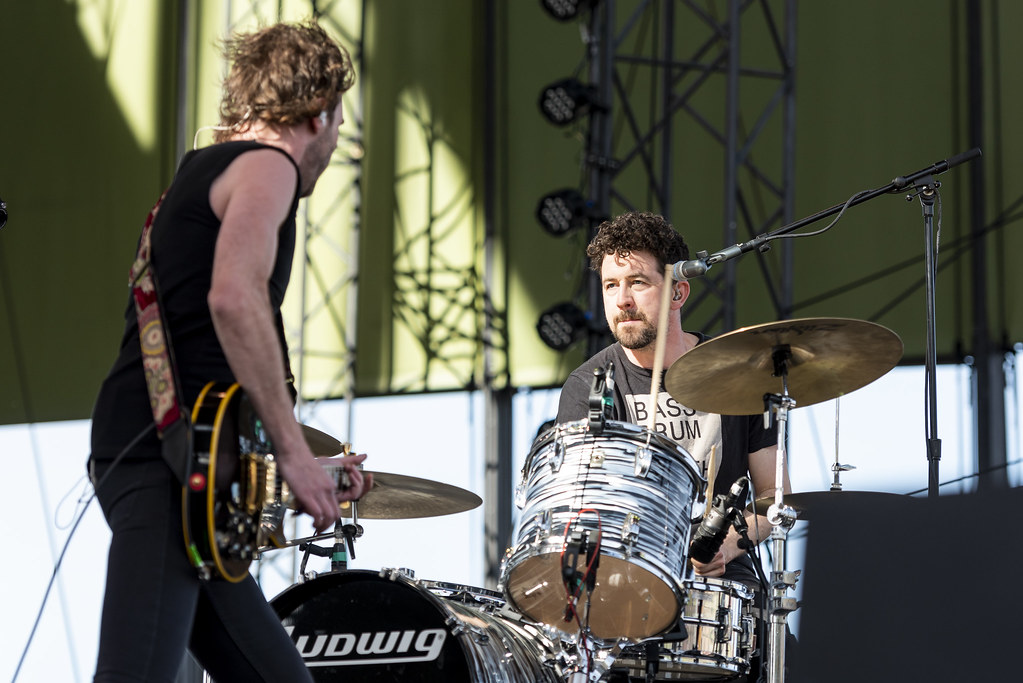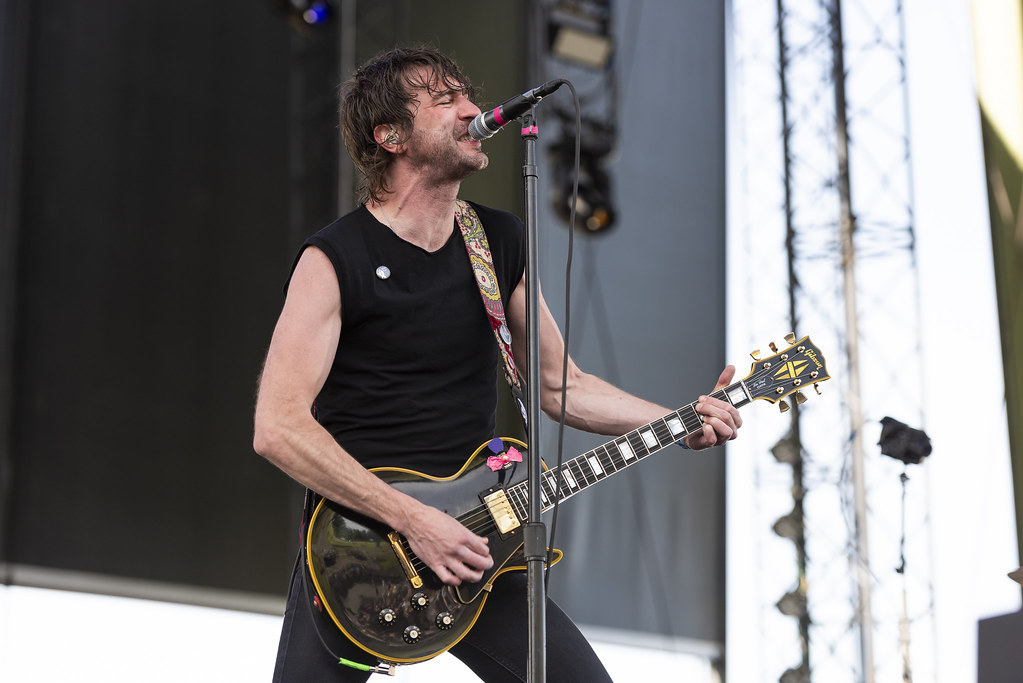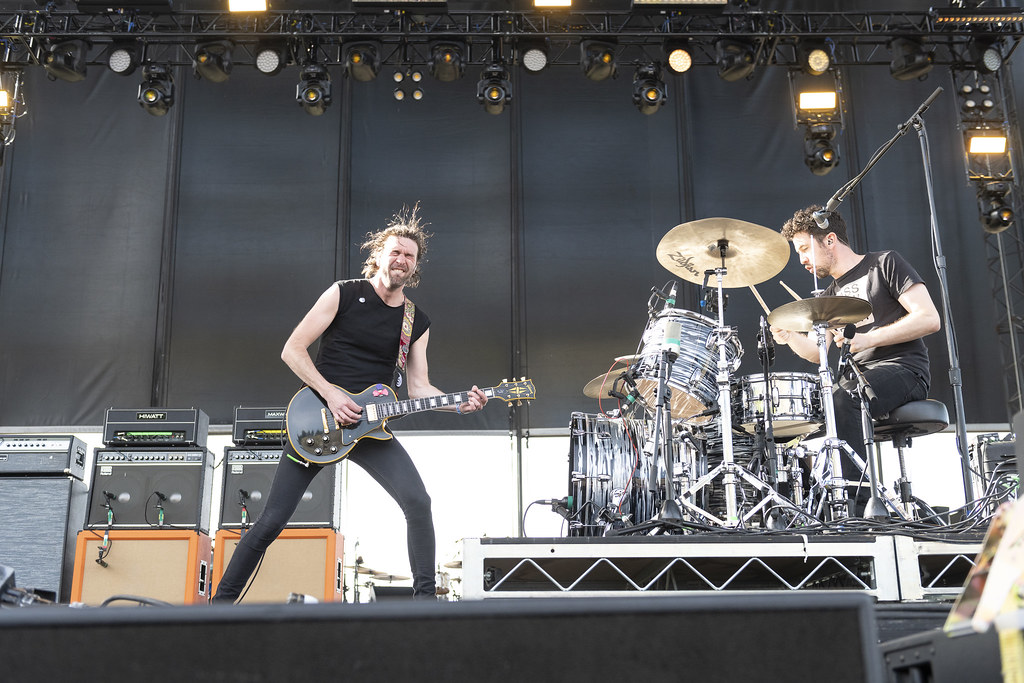
Japandroids have been an undeniable resource for fist-pumping anthems since they emerged from Vancouver B.C. with their debut album, Post-Nothing, in 2009. Since then they’ve continually released songs primed for “yelling like hell to the heavens,” beer in hand and thoughts toward the blissful unknown – regularly culminating in invigorating chants of “Oh yeah!”, “Alright!”, and “Woah!”. But the duo, comprised of guitarist Brian King and drummer David Prowse, is much more than vague platitudes. Within those sing-a-long choruses and eruptions of distortion is a life-affirming energy.
“I can't really imagine Japandroids making a dark, miserable record about how life sucks because I don't think we feel that it does,” King says in the Media Room at Sasquatch! Music Festival prior to the band’s performance at the fest. “ We love what we do and that's the kind of vibe we just put out there when we play”
Therein lies the brilliance of Japandroids. Even when the world feels bleak and your future is uncertain, the band’s music transports you back to “the best night of your life.” It’s something they cemented with their landmark sophomore LP Celebration Rock and an idea they’ve reckoned with in even deeper intricacy on their 2017 album, Near To The Wild Heart Of Life. That record came after five years away, time spent with King and Prowse living apart. It’s also their most polished and refined work to date. To hear the band discuss the record, it’s also kicking down the door for them to venture into even wider territory on their next album.
Their minimalist lineup has provided some big, healthy noise over the years and there’s even more going on beneath the service. Throughout our chat, Japandroids discuss everything from their love of literature and Dead Moon to the new music their working on and where the band might go next. Whatever sounds and ideas the band ends up chasing, there’s no doubt it will be loud, full of love, and full of life.
KEXP: First of all, I want to mention your Dead Moon Shirt.
Brian King: Oh, yeah. Representing the Pacific Northwest.
Were they a big band for you?
King: Yeah, yeah they were. I mean I still listen to them to this day, but they were just one of those bands that always seem to represent the purest form of rock and roll. They write really simple, really direct, kinda straight to the gut songs, and they're out there on the road constantly playing. I feel like, in terms of just a band we certainly always looked up to and wanted to be like, they were certainly one of them for sure. Yeah. They're just a really dedicated, hardworking, kickass rock and roll/punk band.
David Prowse: We were actually on tour with Cloud Nothings back in the fall when we found out that Fred Cole [singer/guitarist for Dead Moon] had passed away. I think it hit all of us pretty hard- both bands. We were all big fans. We actually finished that tour, and we would do a cover with Dylan from Cloud Nothings. He jumped up, played bass and he'd sing lead, and then Brian and I would kinda back him up, and we did three different Dead Moon covers to close our sets those last three nights. It was, you know, our way of paying respect to an artist that meant a lot to us. It's an important band for sure.
We’re talking about the Pacific Northwest, being from Vancouver is kind a big part of your band's identity.
King: I mean, yeah. I think anyone who starts a band in Vancouver can't help but sort of be influenced by the bands, like, from the Seattle area and Portland area. I mean you all kind of share some kind of kinship with each other. So, it's all kind of the same area. There's a fake line on a map, but we're all kinda from the same place in the world, thinkin' about the same things; living the same kind of life.
After you guys took some time off to work on the record and stuff you made your comeback playing a few shows at The Cobalt [club in Vancouver, BC].
King:Yeah, we did four nights at The Cobalt.
Was that kind of a special moment? I went to one of those shows and there was just kind of this energy and a hometown vibe. Was that important to you to enter this new era of the band by bringing it home?
Prowse:I think so. I mean, I think Vancouver is always a great place for us to play, and it seemed like a very natural starting point. We hadn't played in a long time. It was a great way to kind of, like, dip our toes into the shallow end of to the the pool, you know? Like, just do a bunch of really sweaty, punk club kind of shows before we go back to playing some of those bigger rooms. It was a really nice way to start things off for sure. The crowds are always amazing there. We got a lot of support from our local community in Vancouver. So, yeah, it was a great place to start it.

After Celebration Rock you guys had toured for something like over 20 months straight, and you took six months off and started recording. Now you're about a year and a half away from the last record. How are you guys feeling now? You mentioned that after the last tour you felt pretty drained at the end. How is it now? Do you guys feel like you're still going strong?
King:So we decided pretty early on this time around that we weren't going to play as many shows. We weren't going to just tour until we were so tired and so beat down that we needed to take a break. So I think we're somewhere between 100 and 150 shows on this record, and now we're going to wrap it up this summer and just get right back to writing and recording again. We'll try to get back to the writing and recording process while we still have some energy left in our bodies.
Are you guys working on songs now?
Brian King and David Prowse: Yeah, we're going to play a new song today.
For the latest record you guys made the intentional choice of doing a more polished studio record. Do you have ideas of what you want to experiment with next?
Prowse: I think the nice thing about making that last record is it really opened up a door where we can kind of do anything we want now. We had a very specific aesthetic on those first two full lengths and that third record we kind of, I think, tried to expand upon the idea of what a Japandroids song or a Japandroids album could be and could sound like or should sound like. So I think one thing that's really exciting about this next record is I think we have just that much more freedom right at the get go. There's not that sort of debate of, well, what kind of a record do we want to make? Do we need to keep going down that same road we've done before or should we try and expand? It felt very freeing to do that on that third record, and I feel like now we kind of just have like all directions open to us. [laughs].
When you finished writing the record and journaling ideas for the record, you were both living apart for the first time. How do you think that affected the writing of the record? Do you think that's something you would do again? Does distance help or do you guys find that being together is actually more productive?
King: I think it was a challenge in the beginning. Like it's a challenge getting used to it. We kind of had very similar lives in the same city for so many years. And that's, you know, representative of the first however many years we were in the band. So it was like a real adjustment to figure out how we kind of, you know, preserve the things about the band when we live so far apart, and we don't get to see each other as regularly or work on music as regularly. So I think on that last record we were still trying to figure that out. But now we've been living apart for so long that it doesn't feel like this strange new thing anymore. It kind of feels very normal, and I think over the years we've kind of adapted to it in a way that has worked for us. I think if anything all the challenges of living apart that may have affected some things on the last record kind of wouldn't exist anymore. We've just kind of figured out how to make it work, and it's sort of a normal now.

There's a recurring theme in a lot of your work of this sort of life affirming, anthemic vibe where it just kind of feels good to shout along. Is that something you guys want to maintain? Is that important to you as a band?
King: I mean, I don't even think it's sort of a conscious thing. I think it's just a sum of all of your influences mixed with who you are as people and what kind of shows you like to go to. And, you know, it's not like something we sat down and discussed: "Let's make this kind of music." It's just what naturally comes out when we like jam together or we write songs. So, I mean, I think it's an important part of our identity but also very much a natural part of our identity. It just kind of is who we are, and therefore, that's the kind of songs that we make. I'd be very surprised if we ever made any music together that was sort of not, generally, life affirming in some way. I can't really imagine Japandroids making a dark, miserable record about how life sucks because I don't think we feel that it does. We love what we do and that's the kind of vibe we just put out there when we play.
It's the kind of energy that audiences really connect with. How has it been on this tour with the new record? Is there resonance with these songs as you play them every night?
Prowse: Yeah, I think so. A huge part of our show is about audience participation and sort of less about people stoically watching us perform them. It's more that you sort of create this atmosphere where you're all kind of in it together and the crowd is like, part of the show. I mean, that's something that we really thrive on. I think it's an important part of our show. I think even as we tried to expand on that last record we're still wanting to have those moments, you know, where you can kind of already picture the crowd singing back to you. Yeah. So there's definitely those moments on the new record too. That's something we can't help but do. It just kind of works its way into our songwriting at this point.
The title of the album came from a James Joyce book. Are you guys pretty avid readers? Do you find a lot of inspiration from literature? What are you reading now?
King: We both love reading and, of course, being on tour you get a lot of time where you're traveling, sitting in a bus or at the airport or wherever, and you get to read. I'm reading a book called Courtesans and Opium, which is a book that was written by an anonymous author in China at the end of the 19th century, and it's like a classic of Chinese literature. It's considered to be the first novel that somebody wrote in China about life in the city. Nobody knows who wrote it. They don't have a name, and he spent like 30 years drinking and doing opium in brothels and kind of living a very debaucherous life, and then, towards the end of his life, he began to sort of regret a lot of the decisions he made. So he told his life story, which is this book, about 30 years of his debaucherous life in the city as sort of a warning to other people. Like, “Be warned: This is what happens when you sort of live this kind of life,” and he has sort of a repentance in a way for the life that he lived. So that's what I'm reading right now. It's really interesting. I like the idea of writing a work and then publicly putting it out there as anonymous because it's not about you. It's about the story and about his life and kind of, like, wisdom, I guess you could say. Nobody knows who that guy is so it's just strictly about the book. Nowadays authors have a bit of that kind of, like, celebrity status, and this guy was just like, “No. That's not what I'm in it for.”
I like that. I mean, it's interesting. I think of your music as a little more philosophical in a lot of ways, but you distill it in these really easily shoutable choruses. It's interesting to hear about what you guys are consuming and seeing how that impacts your output.
King: I think we take a lot of inspiration from the things you read and the things you listen to and the things you see, but I think it's always kind of like put through like the Japandroids filter. We've never, like, read a book and then written a song about the book, you know? It's always kind of just some kind of meaning that you got out of it that kind of sets a lightbulb off or something like that. It's like how it relates to you in your personal way and putting that out there. It's kind of like an indirect inspiration or something like that.

How has touring been over the past few years? You have a reputation for just having super high energy, exciting live shows. How have you shaped the show over the years and kept it interesting for yourselves and the audience?
Prowse: I'm not exactly sure how to put it, but, you know, as time goes on I think we take what we do a little bit more seriously. I mean, I think we've always taken what we did very seriously, but I think there's a bit more care in sort of carving out a show. You know, we're taking care to do things like involving more production. We now have a dedicated monitor engineer so that we can hear ourselves as well as possible so we can put on the best show we can.
There's definitely a lot of things that we've done over the years compared to when we first started out, and we'd just be like, you know, me and Brian in a Ford Explorer with a trailer full of gear, just drinking ten beers and then going out on stage and pouring your heart out. We still want there to be that sort of little bit of a chaotic element to it. We've always taken great strides to put as much energy and passion into what we're doing on stage, but I think the big thing now is we're a little bit more... I don't know. We just kind of think about it in a slightly different way, and I think we try to put a little bit more care into the show beyond just like, "Wow! This is exciting that we're going to play here. Let's drink ten beers and just, like, go out there and let it rip!".
What's next for you guys? Are you going to go work on the new album?
King: Yeah, we've got a bit more touring to do. We've got another week of shows after this, and then we go to Europe for a few weeks in July to do some festivals and stuff. Then there's a couple a more US shows, I guess, through July. So we're touring for the next little while. And then, starting in August, we're going to take some time off to just focus on writing and recording. So last chance to see Japandroids for a while and then hopefully new music.
The former Bomb The Music Industry frontman talks about his new album, scoring Cartoon Network's Craig of the Creek, and the political thought that prompted his latest album POST-
David Bazan discusses taking up his old moniker once again, the next five Pedro albums, and utilizing his platform to bring attention to white male privilege and abuse against women.
Day Two of the Sasquatch! Music Festival continued with some incredible performances from Modest Mouse, TV on the Radio, Pedro the Lion, Explosions in the Sky, and more.